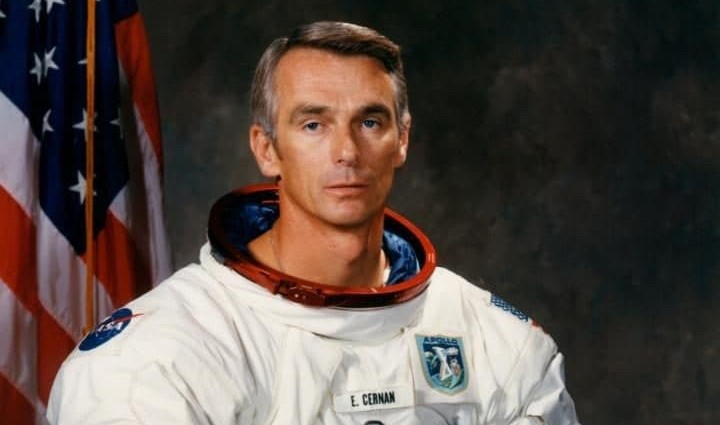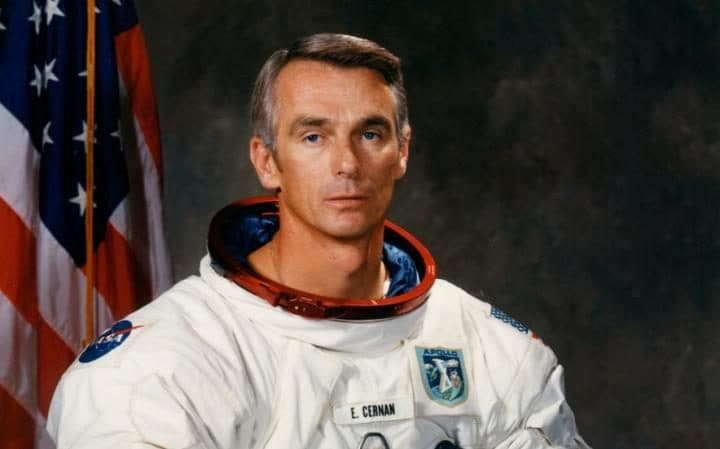Gene Cernan, the last person to walk on the moon, dies aged 82, Nasa announces

Former US astronaut Eugene Cernan, who became the last astronaut to walk on the moon in an experience that he said made him one with the universe, died on Monday at 82, the US space agency said.
Cernan, who also was one of the first men to go on a spacewalk, died surrounded by his family, Nasa said in a statement without giving details.
Cernan and fellow Apollo 17 astronaut Harrison Schmitt became members of the most exclusive club in the universe on Dec 11, 1972, when they stepped from their lunar landing module onto the moon's surface. Only 10 other people — all American astronauts — had done so before and none have done so since.
They rambled more than 19 miles in a lunar roving vehicle and gathered more than 220 pounds (100 kg) of rocks during their 22 hours of exploration of craters and hills.
"I knew that I had changed in the past three days and that I no longer belonged solely to the Earth," Cernan, a former Navy test pilot, wrote in a memoir titled "The Last Man on the Moon." "Forever more, I would belong to the universe."
Cernan was 38 years old when he blasted off for the moon on Dec 7, 1972, as commander of Apollo 17. With Ronald Evans orbiting above in the command module, Cernan and Harrison Schmitt, a geologist, rode the lunar lander to the moon's surface four days later.
They explored for about seven hours each day and Cernan wrote that moonwalking was painful for him because he had injured a tendon in his leg two months earlier playing softball.
On the day before returning to the command module, Cernan drove the rover to a point away from the lunar module so that a camera on the vehicle could film their departure. He then paid tribute to his young daughter, Tracy.
"I took a moment to kneel and with a single finger, scratched Tracy's initials, TDC, in the lunar dust, knowing those three letters would remain there undisturbed for more years than anyone could imagine," Cernan wrote in his memoir.
The size 10-1/2 boot prints that Cernan made on his walk back to the module afterward marked the last steps man has taken on the moon. Cernan said he spoke spontaneously as he returned to the lunar module.
"As we leave the moon and Taurus-Littrow (a deep lunar valley where they had landed), we leave as we came, and God willing, as we shall return, with peace and hope for all mankind," he told mission control.
"As I take these last steps from the surface for some time to come, I'd just like to record that America's challenge of today has forged man's destiny of tomorrow. Godspeed to the crew of Apollo 17."
Cernan, who grew up near Chicago, retired from NASA and the Navy in 1976. As a civilian he helped start Air One airline, worked as an energy and aerospace consultant, served as chairman of an engineering company and was a space commentator for ABC News.
In a 2007 interview for NASA's oral history program, Cernan recalled his final moments before climbing back in the lander.
"Those steps up that ladder, they were tough to make," he said. "I didn't want to go up. I wanted to stay a while."
Early US space history fading
Early US space history is fading with the deaths of Cernan, John Glenn, the last of the Mercury 7 astronauts, and Neil Armstrong, the first man to walk on the moon. But others survive, veterans of a time when Americans were glued to their television sets to watch their heroics, from fiery Saturn V launches to ocean splashdowns.
More than half of the first 30 astronauts NASA hired have died. "There's going to come a time and it's probably going to be in the next decade or so when none of the moonwalkers are going to be left," said National Air and Space Museum associate director Roger Launius.
"As this history recedes into the background and fewer and fewer people remember it, the more mythological it becomes," he said. "The majority of the human race has been born since we've left the moon so they don't have knowledge of it."
Политика конфиденциальности | Правила пользования сайтом









